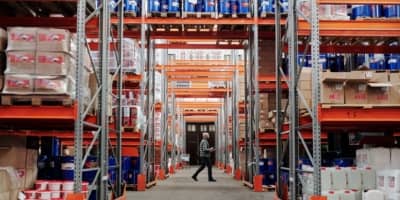Since shops reopened to the public, the British retail industry has demonstrated promising signs of recovery. Wholesalers, however, have struggled to meet the shifting needs of retailers amidst the 'pingdemic', which led to widespread shortages of warehouse staff, delivery drivers, and replenishment workers. Moreover, Brexit delays at customs have severely disrupted the entire supply chain, making it difficult for wholesalers to secure the right products at the right time.
While the last year has proved difficult for the industry, there are many reasons for new wholesale businesses to emerge at this time. A post-lockdown rise in consumer spending means that retailers are striving to keep their shelves stocked. For wholesalers that capitalize on this heightened demand by pivoting operations, diversifying product ranges, and nurturing strategic relationships, there's a clear opportunity to become a market contender.
What is a wholesaler?
Most manufacturers don’t sell their goods directly to an end-user. Instead, products are sold to a wholesaler, then to a B2C business such as a retailer, before finally reaching the consumer. Therefore, wholesale businesses act as intermediary bodies that facilitate the movement of goods within the supply chain.
Wholesale businesses buy in bulk from a manufacturer or distributor to resell in smaller volumes. Due to the large quantities of their orders, wholesalers can purchase items at a reduced price before selling for profit. They traditionally follow a B2B model, but an increasing number of wholesalers also sell directly to consumers.
How profitable are wholesalers?
Wholesalers significantly benefit from economies of scale by purchasing in bulk, which allows them to negotiate lower costs per unit. When selling to retail stores in small quantities, or consumers in a B2C distribution model, wholesalers add their profit margin to their products.
Successful wholesale businesses operate at relatively low costs by streamlining their purchase, storage, and distribution processes. Although wholesalers oversee a number of tasks like managing inventory, picking and packing orders, and transporting shipments, their systems are highly specialised. By focusing on a few key functions, wholesale operations can be extremely efficient at moving goods along the supply network.
To turn a profit, business owners must pay attention to their finances. When dealing with multiple customers, each with their own payment terms, businesses faced with unpaid invoices can find themselves without the necessary funds to reinvest in stock. Similarly, if wholesalers aren’t accurate with their ordering, they can be left with unsold goods tying up capital. Fortunately, there are ways that small wholesale businesses can protect their cash flow, such as negotiating rates with suppliers, working with reputable buyers, or securing a short-term loan.
How to start a wholesale distributor business
You'll need to tackle some important decisions if you're looking to open a business in the wholesale industry. Business planning is vital to the success of any venture, so follow these eight simple steps to ensure your wholesale company is anything but a logistical nightmare.
1. Analyze the market
The first step to launching a startup wholesale business is analyzing the market to identify opportunities. For your business to be viable, there must be demand for your goods and services. Therefore, you need to undertake some market research to understand what types of products are sought after by customers, and which retailers align with that target audience.
In addition, competitor research will allow you to find a gap in the market so you can differentiate your business from its rivals, whether on product lines, order sizes, price, or quality of service.
2. Choose a business model
The most common type of wholesaler is a merchant wholesaler, which bulk order from manufacturers to supply other businesses. These companies take ownership rights over the merchandise and will either operate as full-service or limited-service entities. A cash-and-carry store, for example, offers a basic service that doesn’t include delivery or online ordering. While this approach requires minimal investment, you'll have to compete on price rather than buying experience to win new clients.
Brokers and agents, on the other hand, don’t take ownership of the products and simply negotiate between buyers and sellers. By operating under this model, you assume a lower financial risk but only receive a percentage of the total sales value from the supplier.
3. Find a location
Unlike a retailer, you won't need to budget for a spot on the high street or invest in curb appeal to attract shoppers. However, a large amount of space is required to store bulk-ordered goods, so find a location with low business rates. Otherwise, the costs of renting or buying a warehouse will hamper your profits.
Although a prime location isn’t necessary, bear in mind that it must be convenient for your customers to access if you decide to sell from your warehouse or depot.
4. Pick your suppliers
Finding reliable suppliers is key to the success of your business, as providing high-quality goods and quick fulfilment times will encourage customer loyalty. To source a reputable supplier, you could consult approved supplier lists from trade associations or get a personal recommendation.
It’s also important that the producer is compliant with industry regulations, so be sure to check you’re working with a certified vendor before you start selling their goods. Furthermore, as consumers become increasingly aware of ethical and sustainability issues in supply chains, business owners must take care to scrutinize their supplier's working practices before entering a partnership.
5. Optimize your sales channels
Brick-and-mortar stores continue to be utilized by many UK wholesalers, including Costco, Booker, and Bestway. These sites allow retailers to pick their products, pay for them, and potentially sell them to the consumer on the same day.
However, like their retail partners, many wholesalers have shifted online to adjust to new ways of working. As a result, using an ecommerce platform or online marketplace could help you reach more customers and offer a more convenient buying experience.
6. Promote the business
There are many marketing and advertising techniques to raise the profile of a small business, even on a budget. Depending on your target audience, this may require online or offline outreach, or a combination of the two.
For online marketing, wholesale business owners can use social media and email campaigns to drive website traffic. Beyond digital channels, consider distributing leaflets to potential customers, creating radio or tv campaigns, or placing advertisements in trade journals and local directories.
7. Set your pricing
Once you’ve chosen your product range and suppliers, you can establish your prices and minimum order quantities. Whilst profit is important, you should focus on establishing solid relationships with customers and suppliers in the first few months. Special offers will attract new customers to your business and encourage larger orders, but make sure to calculate the best discount price without diminishing profits.
8. Leverage technology
There are a few tools and platforms that are essential for any wholesale business. Inventory management software is perhaps the most important for a growing wholesaler as this technology will streamline your operations and mitigate losses. By using automated inventory management, you can easily track your stock, identify changes in demand, and avoid storing large amounts of unsold inventory.
Need fast, flexible funding to support your wholesale operations?
Whether you're looking to bridge a cash flow gap or take advantage of a bulk-buying opportunity, our wholesale business loans are built with small and growing wholesalers in mind. Explore our wholesale finance options.









These cookies are set by a range of social media services that we have added to the site to enable you to share our content with your friends and networks. They are capable of tracking your browser across other sites and building up a profile of your interests. This may impact the content and messages you see on other websites you visit.
If you do not allow these cookies you may not be able to use or see these sharing tools.